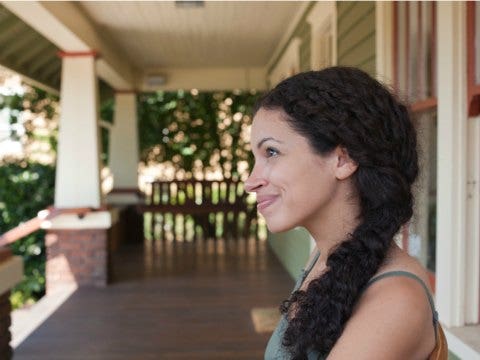Young & Single? Here's Your Guide To Buying A Home
You don't have to be married to have a house of your own!

While it's true that more money buys more of a home, and two incomes are usually better than one in that regard, it's also true that many single people can afford — and are willing — to take on the responsibilities and expense of home ownership on their own. In fact, many millennials who entered the workforce during the recession are averse to investing in the stock market, preferring real estate instead.
Interest rates in recent years brought affordability to all-time highs, making it easier for millennials to purchase homes. In fact, a 2013 study indicated that the wealthiest 10 percent of millennials will account for a full fifth of all dollars spent on primary home purchases over the next few years.
Luxury market
Recently, the Wall Street Journal reported on some wealthy young first-time buyers who are skipping the "starter home" altogether, going straight to a luxury home for their first purchase. Many of these buyers made money starting their own tech companies or during the IPOs of Google and LinkedIn. Others are simply the beneficiaries of the fact that although middle class income has dropped slightly, the wealthiest people in the world became significantly wealthier. According to the Pew Research Center, the mean net worth of households in the top 7 percent nationwide grew 28 percent from 2009 to 2011, while the other 93 percent of households saw their net worth fall by 4 percent during the same time.
Unmarried couples
It pays to take advantage of a good deal when it comes along. We don't have to be rocket scientists — or wealthy — to see that the market has bottomed out, prices are going up, and mortgage interest rates are rising. Rather than miss out on a good opportunity to buy before prices and rates go up, some couples are choosing to take the homeownership plunge before tying the knot.
Do the paperwork
Consider contingencies. You might not think there's any chance of splitting up, but if you're buying a home with a partner you're not married to, at least consider the possibility that things won't work out. You don’t have to become a huge believer in prenups to at least address both parties' interests with regard to what's probably the single largest purchase either of you will make for the foreseeable future. Create a legal agreement that specifies ownership details, who pays what expenses (and how much), and what your preferred plan of action would be in case of a split.
Also, research the various ways to hold title in order to determine which one best meets your needs. Decide whether both names will be on the mortgage. Research your state’s laws about domestic partnership. See this New York Times article for more questions that you should ask your lawyer or financial advisor.
If you're buying a home on your own, don't look at it as an investment. Look at it as a home. Your primary residence is not a liquid asset and should not be considered money in the bank until the day you decide to sell (and then only if your equity permits).
Whether buying alone or as part of a couple, you'll need to get ready to apply for a mortgage. Your credit score and credit history should qualify. If your credit history isn't free from blemishes or your credit score isn’t outstanding, you might be better off pursuing an FHA loan, which typically comes with less stringent requirements.
More juicy content from Credit Sesame:
- How Much House Can I Afford — The First Question in Home Ownership
- House Hunting with Confidence: 5 Steps to Prepare for the Hunt
Written by Kimberly Rotter for Credit Sesame.
